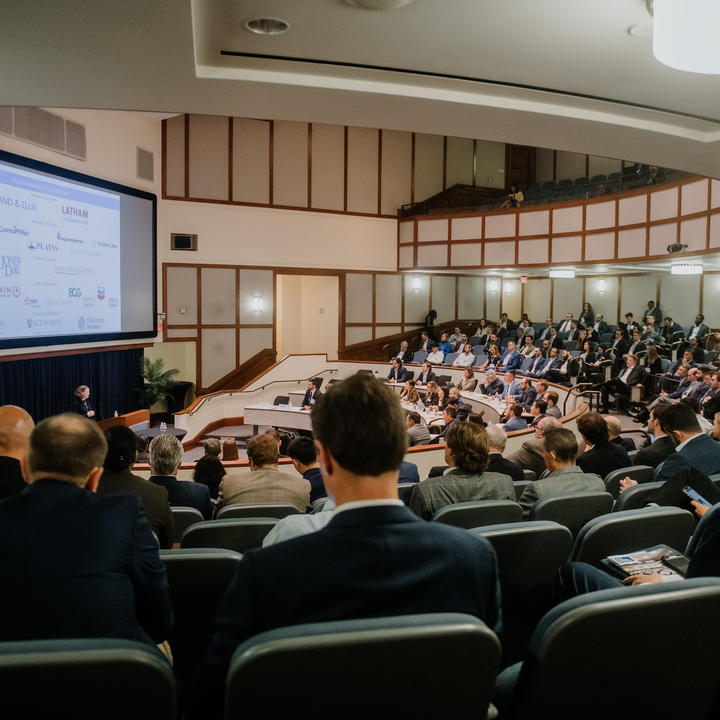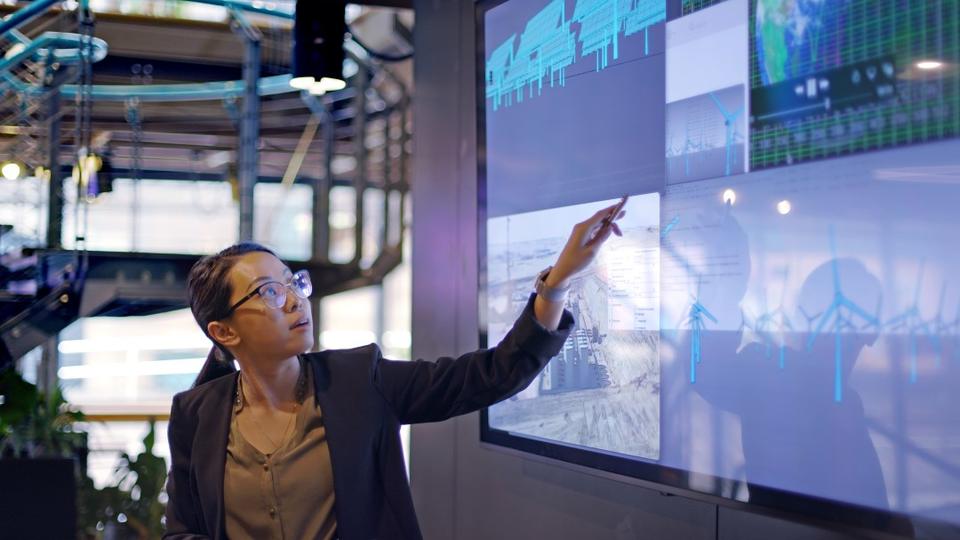
Energy
About Our Energy Faculty and Research
Our faculty bring the commercial acumen and leadership experience of Houston's vibrant energy and oil and gas sectors to the classroom. Our courses in the geopolitics of energy, safety, business analysis and operations are widely regarded as preparing students for leadership positions in midstream and upstream energy industry organizations.
Held annually in November, the Rice Energy Finance Summit is a student-led conference promoting discussions on the most relevant energy finance, investment and strategy topics affecting the global energy industry. It serves as a distinguished platform for senior executives, investors, advisors and policymakers to share their perspectives with over 400 fellow energy industry professionals and Rice University students, alumni, faculty and staff.
Learn more
The CEMA Annual Meeting is a benchmark academic conference, gathering researchers and practitioners engaged in the study or application of economics, finance, mathematics, operations and risk management in commodity and energy markets.
Learn more


Faculty research applied in the classroom.
Sample Energy Electives
Explore courses in the energy industry, covering topics such as energy geopolitics, safety, business analysis, and operations.
-
Introduces the valuation and financing of energy projects. Students learn from industry professionals about various types of projects their firms have undertaken. The course emphasizes evaluating the risks and issues involved in getting project financing.
-
This course examines long-term projections of world and U.S. energy markets to 2050. Students will analyze the impact of input assumptions on modeled trends in the energy sector, with an emphasis on renewables. Teams will assess the risk, uncertainty, and relative impact of economic growth, demographics, oil price, oil and gas supply, renewables cost, policy, and other assumptions. Students will also consider how policies, investment, and technology advances could drive energy trends to lower emissions. Mutually exclusive: Students cannot register for MGMT 609 if they have credit for MGMT 612.
-
The course is based on the principle that one cannot understand commodity markets without a good grasp of the technology and physical infrastructure behind production, transportation, and distribution of energy commodities and linkages between different segments of the energy complex. The review of the industry infrastructure will be followed by discussion of the institutional framework of the energy markets in the US and other developed economies, including discussion of the different types of participating business entities, types of transactions and regulatory infrastructure. The course will be divided into three groups of lectures, covering the natural gas industry, power and coal business and oil / refined products markets, with an additional shorter lecture on regulatory issues.
-
This course examines the global energy landscape, with a focus on the political, economic and environmental forces that shape it. Students will learn about the role of energy in global governance, the challenges facing energy producers and consumers, and the potential for new technologies to disrupt the status quo. Using academic theory and case discussion, students will examine energy business challenges in countries with diverse political systems and wide-ranging levels of economic development.
-
This course will introduce students to the basics of the energy sector and the energy transition. Students will learn about the different types and sources of energy resources, the fuel conversion processes and technologies used to produce energy, the demand drivers and barriers to growth in the energy sector, the influence of policy and regulatory environments, and the social, economic, and environmental impact of energy choices.
-
The course offers a review of the US energy markets across the entire commodity spectrum: natural gas, oil and refined products, electricity, renewables and renewable energy credits, coal and emission allowances. Some aspects of the international energy markets will be covered as well; to the extent the material is critical to understanding of the US energy business. The class is recommended to anyone contemplating a career in energy trading and marketing, energy risk management, or regulatory institutions.
-
This class covers the analytical techniques used to price financial derivatives in the energy industry. Topics include: pricing European, American, Asian, binary and spread options on forwards; applications of financial derivatives in managing market and credit risk; and the use of financial derivatives to speculate on future price movements.
-
This short course explores the intersection of transportation and energy, with a focus on the United States. Students will learn about the different mobility modes, energy sources, and delivery channels that are being used to transition to a cleaner, cheaper, safer, and more accessible transportation system. They will also learn about the different policies and initiatives that are being implemented to support this transition.
-
This course introduces students to the fundamental principles of managing physical assets in energy value chains. The course will focus on understanding how costs, capacity constraints, and market or technical risks affect operational decisions, such as investments in new capacity or technology. Students will learn how to apply these principles to real-world problems in the energy industry, which is in the midst of an ongoing transition toward net zero emissions.
-
This course covers the valuation and financing of new or non-traditional energy projects. Topics include renewable energy projects, carbon sequestration, and enhanced recovery techniques.
-
This course teaches students about the different sectors in the energy transition from an investor's point of view. Students will learn about renewable power, battery storage, carbon capture, hydrogen, and renewable fuels. Working in teams, students will learn about the different types of private equity funds, how to develop an investment thesis, and how to pitch their fund to a mock board of limited partners.
-
This course examines the political risks that can impact energy investments. Topics include the political economy of investment in oil, gas, and renewables, the structural factors that shape risk during the life cycle of a project, the institutional environments of host jurisdictions, and strategies for managing risk. The course will focus on case studies from Latin America and current events.
-
This course gives students the opportunity to apply their knowledge, skills, and experience to explore an energy topic of their choice. Topics could include energy security, economic competitiveness, environmental responsibility, the integration of oil, natural gas, and renewable power, or the use of information and communication technologies in the energy sector. Working in teams of 2-3, students will research their chosen topic and identify a relevant NGO, government, or industrial organization. They will develop a project plan that outlines the potential impact of actions, investments, and policies on future outcomes.
-
This course focuses on capital themes across the energy transition. Student teams will construct, validate, and propose a climate tech investment opportunity.
-
Energy companies are under great pressure to transition from traditional fossil energy to renewable energy. This course examines the strategies that energy companies are using to manage the transition. Topics include the role of corporate venture capital (CVC) investments, the challenges of balancing traditional and renewable businesses, and the relationship between startups and CVC investors.















